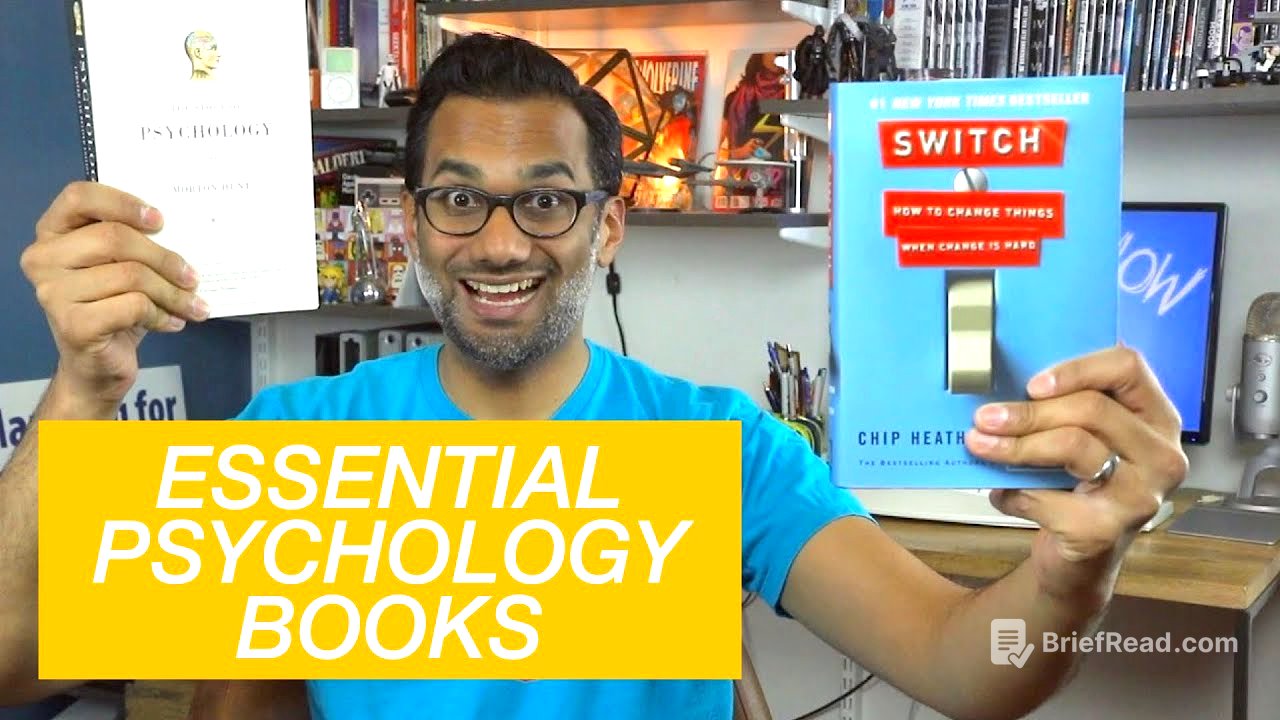TLDR;
Doctor Ali Mattu shares a list of 7 essential psychology books for those interested in learning more about the subject. These books are accessible to a general audience and cover a range of topics, from political polarization and neuroscience to mental illness and cultural understanding. The list includes:
- "The Righteous Mind" by Jonathan Haidt, which explores the emotional roots of morality and political divisions.
- "Phantoms in the Brain" by V. S. Ramachandran and Sandra Blakeslee, which simplifies clinical neuroscience through fascinating case studies.
- "Marbles" by Ellen Forney, a graphic memoir that provides an honest depiction of bipolar disorder.
- "Remembering Satan" by Lawrence Wright, which examines the fragility of memory and the impact of group pressure on the justice system.
- "The Spirit Catches You and You Fall Down" by Anne Fadiman, which highlights the importance of cultural understanding in healthcare.
- "Switch" by Chip Heath and Dan Heath, which offers a simple framework for behavior change.
- "The Story of Psychology" by Morton Hunt, a comprehensive overview of the history of psychology.
Introduction [0:02]
Doctor Ali Mattu acknowledges that while The Psych Show makes psychology accessible, it lacks depth. To address this, he presents a list of seven essential psychology books suitable for anyone interested in the subject, regardless of their academic background. These books are written for a broad audience and require only a love for psychology to understand.
#7: The Righteous Mind: Why Good People Are Divided by Politics and Religion [0:40]
Jonathan Haidt's "The Righteous Mind" explores how morals unite people but also blind them to other perspectives. It explains that emotions drive our psychology, causing our thoughts to defend our feelings. This leads to the justification of beliefs, even when they lack logical sense, especially when threatened by opposing views. Haidt maintains a non-partisan approach, even addressing liberal biases within psychology and emphasizing the importance of diverse perspectives. The book is recommended for understanding the increasing political polarization worldwide.
#6: Phantoms in the Brain [1:37]
V. S. Ramachandran and Sandra Blakeslee's "Phantoms in the Brain" makes clinical neuroscience accessible. Each chapter covers a different neurological disorder, such as phantom limb syndrome and Capgras Delusion, in a way that reads like a mystery novel rather than a textbook. The book walks the reader through Ramachandran’s thought process and highlights the simplicity of some of his solutions, such as using a mirror to alleviate phantom limb pain.
#5: Marbles: Mania, Depression, Michelangelo, and Me: A Graphic Memoir [2:34]
Ellen Forney's "Marbles" is a memoir about mental illness, specifically bipolar disorder. Forney uses her skills as a cartoonist to illustrate the effects of depression, the highs of mania, and the experience of therapy and medication. The book is brutally honest and insightful, making it a recommended read for those entering the mental health field.
#4: Remembering Satan: A Tragic Case of Recovered Memory [3:03]
Lawrence Wright's "Remembering Satan" explores a real-life case of alleged child abuse in a Satanic cult. The book reveals how memories can be manipulated, the unreliability of eyewitness testimony, and the susceptibility of the justice system to group pressure. It challenges the reader to question the reliability of memory and what is considered real.
#3: The Spirit Catches You and You Fall Down [3:40]
Anne Fadiman's "The Spirit Catches You and You Fall Down" tells the story of a Hmong refugee family's miscommunication with their healthcare team and its impact on their daughter. The book raises issues of cultural differences, translation challenges, and the concept of "cultural competence." The key takeaway is the need to understand others in their own terms rather than assuming competence in their culture.
#2: Switch: How to Change Things When Change Is Hard [4:40]
Chip Heath and Dan Heath's "Switch" presents a simple approach to changing behavior in groups, organizations, and communities. The authors suggest that effective change requires providing a rationale, appealing to emotions, and creating an environment that facilitates change. The book emphasizes the importance of emotions and environment, which are often overlooked in favor of rationale.
#1: The Story of Psychology [5:32]
Morton Hunt's "The Story of Psychology" provides a comprehensive overview of the history of psychology, focusing on major figures and developments. The book explores the discoveries, perspectives, and personal politics that have shaped the field, primarily focusing on Western white male psychology. Despite its length, it is considered a must-have for those passionate about psychology.









